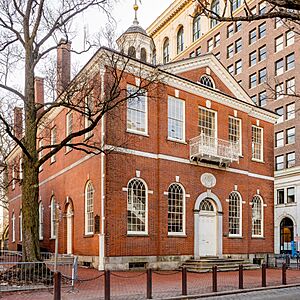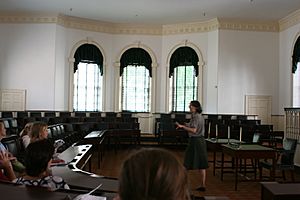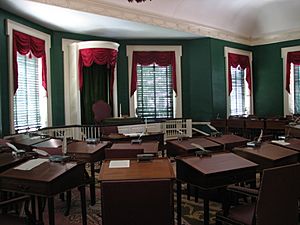Congress Hall facts for kids
Quick facts for kids Congress Hall |
|
|---|---|

(2024)
|
|
| Former names | Philadelphia County Courthouse |
| General information | |
| Architectural style | Federal |
| Location | Chestnut Street at 6th, Philadelphia, Pennsylvania, U.S. |
| Coordinates | 39°56′57″N 75°09′03″W / 39.9491°N 75.1507°W |
| Current tenants | National Park Service |
| Construction started | 1787 |
| Completed | 1789 |
| Owner | City of Philadelphia |
| Design and construction | |
| Architect | Samuel Lewis |
Congress Hall is a very important building in Philadelphia, Pennsylvania. It's located at Chestnut and 6th Streets. From December 6, 1790, to May 14, 1800, this building was the official home of the United States Congress. This means it was the capital of the United States for almost ten years!
During this time, many big things happened here. Three new states joined the country: Vermont, Kentucky, and Tennessee. The Bill of Rights, which protects important freedoms, was also approved here. Plus, two presidents, George Washington (for his second term) and John Adams, were sworn into office at Congress Hall. Today, the National Park Service takes care of Congress Hall. You can even take tours to see what it looked like way back in 1796! It's right next to Independence Hall.
Contents
Why Philadelphia Was the Capital
Philadelphia was the capital of the United States during and right after the American Revolutionary War. The Continental Congress used to meet at Independence Hall, which is next door. However, in 1783, some angry soldiers caused trouble in Philadelphia. Because the government couldn't protect Congress, the representatives decided to move.
The capital then moved to different cities. It went to Princeton, New Jersey, then to Annapolis, Maryland, and later to Trenton, New Jersey. Finally, it moved to New York City in 1785. Even when the Constitutional Convention met in Philadelphia in 1787 to write the United States Constitution, New York City was still the official capital.
Building Congress Hall
Congress Hall was designed by an architect named Samuel Lewis. It was first built to be the courthouse for Philadelphia County. Construction started in 1787 and finished two years later in 1789.
A Temporary Home for Congress
The United States Constitution gave Congress the power to create a special area for the national capital. While meeting in New York, Congress passed a law called the Residence Act on July 9, 1790. This law decided that the new permanent capital would be the District of Columbia. This new capital was to be built along the Potomac River between Maryland and Virginia.
However, a senator from Pennsylvania, Robert Morris, convinced Congress to come back to Philadelphia while the new capital was being built. So, the Residence Act also said that Philadelphia would be the temporary capital for ten years.
Philadelphia's Efforts to Keep Congress
To try and convince Congress to stay, Philadelphia started building a huge new house for the president. They also expanded the county courthouse, which became Congress Hall. When Congress returned to Philadelphia on December 6, 1790, the first floor of Congress Hall was ready for the House of Representatives. The second floor was set up for the United States Senate.
Even with all these new buildings, the city couldn't persuade Congress to change its mind. Philadelphia remained the capital only until May 14, 1800. After that, the national government moved to Washington, D.C..
Inside Congress Hall
Congress Hall has two main rooms, one for the House of Representatives and one for the Senate.
The House Chamber
The House chamber is on the first floor. It was quite simple, with mahogany desks and leather chairs. This room eventually held 106 representatives. These representatives came from the 13 original states and the three new states: Vermont (1791), Kentucky (1792), and Tennessee (1796). The room has been restored to look just like it did in 1796.
The Senate Chamber
The Senate chamber is on the second floor and was more fancy. It had heavy red drapes. By 1796, there were 32 desks, very similar to the ones still used in the current Senate chamber in the United States Capitol. Twenty-eight of these desks at Congress Hall are original!
In nearby committee rooms, you can see portraits of Louis XVI and Marie Antoinette. These were gifts from the French king after the American Revolution. On the ceiling, there's a painting of an American bald eagle holding an olive branch, which means peace. Also on the ceiling, a plaster design shaped like a sunburst has 13 stars. These stars represent the original 13 colonies. The floor also has a similar design. A carpet made by a local weaver named William Sprague shows the shields of the 13 original states. The carpet you see today is a copy of the first one.
Congress Hall's Important History
For almost ten years, Congress Hall was the center of American government. Many important things happened here:
- Three new states joined the United States.
- The United States Bill of Rights was approved.
- George Washington was sworn in for his second term as president in 1793.
- John Adams became president in 1797.
- Congress created the First Bank of the United States, the Federal Mint (where money is made), and the United States Department of the Navy.
- The Jay Treaty, which helped keep peace with Great Britain, was also approved here in 1796.
After the capital moved to Washington, D.C., Congress Hall went back to being the Philadelphia County Courthouse. It was used for both state and federal courts in the early 1800s. The Burlington County Courthouse in Mount Holly Township, New Jersey, built in 1796, was even designed to look like Congress Hall.
Restoring Congress Hall
After its time as a courthouse, Congress Hall started to get old and worn down. In 1870, a law was passed to tear down all the buildings around Independence Hall, but this law was never put into action. It was officially canceled in 1895.
A group called The Colonial Dames of America helped start the restoration of Congress Hall. Architect George Champlin Mason Jr. began this work in 1895-96, focusing mostly on the Senate chamber. In 1900, the Philadelphia chapter of the American Institute of Architects (AIA) began studying Congress Hall and raising money for a full restoration. The City of Philadelphia approved the project in 1912, and the AIA oversaw the work.
The restoration was finished the next year, and President Woodrow Wilson officially opened the building again. More work to fix up the House chamber was done in 1934. In 1942, many groups came together to form the Independence Hall Association. This group worked hard to create Independence National Historical Park, which Congress approved in 1948 and officially established on July 4, 1956.
Today, the National Park Service takes care of Congress Hall. They offer guided tours throughout the year. On December 2, 2008, President-elect Barack Obama even held a meeting there with governors to talk about the financial crisis at the time.
See also
 In Spanish: Congress Hall para niños
In Spanish: Congress Hall para niños
- List of state and county courthouses in Pennsylvania
 | Janet Taylor Pickett |
 | Synthia Saint James |
 | Howardena Pindell |
 | Faith Ringgold |



